- Home
- Jeff Mariotte
The Burning Season Page 16
The Burning Season Read online
Page 16
“Not a problem,” Ray said. He shivered a little at the sight.
“Sorry,” Robbins said. “Does that bother you?”
“It wouldn’t have, a few weeks ago,” Ray replied. “I guess it’s just a little close to home at the moment.” He started toward the freezer unit Robbins had indicated. “Actually, have the hands been thoroughly examined?”
“Examined for what?”
“Tool marks, I was thinking.”
“Yes,” Robbins confirmed. “Either I checked them, or David Phillips did.”
“No need for me to duplicate the effort, then. I’ll just review your reports.”
“If you’d rather thumb through those than manhandle the real things, suit yourself.”
“I will,” Ray said. The medical examiner’s sense of humor almost never failed him, even when it came mostly in the form of puns that would make a sane person groan. Ray always appreciated it—but there were times he didn’t want Robbins to know that, because it would only encourage him. “Thanks for your help.”
“If you need me, give me a call,” Robbins said. “I believe you’ve got my digits.”
* * *
Back at his desk, Ray read through the reports on the severed hands, closely examining the photos of tool marks on the bones. Four hands had been discovered, over the past six months. Three were male, one female. They were all left hands. All had been DNA-tested, but no identifications had been made. No one had come forward to claim the hands. In three cases, there had been enough skin remaining on the hands to determine that they had an olive complexion.
Tool marks on two of the hands, the second and third ones found, matched. They didn’t match any of the others, though, and none matched the newest hand.
In the case of the third hand, epithelial cells had been found under two fingernails. DNA from those skin fragments had also been analyzed—another dead end. Ray had the reports spread out on his desk, trying to look at them through someone else’s eyes, in case there was something that he just wasn’t seeing, when Carrie walked in with a printout. “Here’s what we’ve got on your samples so far,” she said, handing the sheets to Ray. “Whoever they came from, he’s not in the system.”
“He?”
“I was able to determine that much. Male, probably Hispanic. But no ID beyond that. I can dig a little deeper into it, see if I can come up with anything else.”
“Dig as deep as you can, but thanks for this,” Ray said.
“Sure, glad to help.”
She disappeared, and Ray studied the report she’d handed him. The stats on the page looked familiar—lines of letters, others with numbers and letters, all of it meaningless to the average civilian and the average juror. Even now, so many years after the O.J. Simpson case, DNA technicians and CSIs still had a hard time explaining DNA sequencing to juries in a way they could understand. They wanted the process to be as simple as one of those pregnancy tests that showed a plus sign for positive. This result means the accused did it, that one means he didn’t. Unfortunately, it didn’t work that way. The best that could be claimed was that DNA offered a billion-to-one chance that the suspect was not the one who had left evidence at the scene. To which some defense attorney always asked, “You mean, there’s a chance that it wasn’t him?”
“A billion-to-one is hardly a chance,” the beleaguered expert would contend.
“But it’s not one hundred percent, absolutely positive.”
“It never is.”
“Thank you,” the defense attorney would usually say at that point. “No further questions.”
Ray pored over the report, wondering why the data on it rang a bell. Then, as if waking up from a nap, he shook his head and almost kicked himself. He turned back to the DNA profile of the person whose epithelial tissue had been found under hand number three’s fingernails.
“It’s the same person,” Ray said softly. “I’ll be damned, it’s the same guy.”
He studied both again, matching up the letter strings, the graphs. Identical. A billion-to-one chance that it wasn’t the same man, maybe. Which was the same as saying no chance at all.
He still didn’t know to whom the skin cells belonged. But it was a start.
It was better than he’d had five minutes ago.
Sara shielded her eyes against the sinking sun—another thirty minutes, forty at the outside, and it would be gone—and scanned the upper reaches of the mountainside.
“You lose a contact lens?” Nick asked.
She ignored the feeble gag. “Arsonists like to watch their fires,” she said. “In urban areas, you always try to videotape the crowd outside a fire scene, right? Because chances are, he’s there.”
“True.”
“Here, there was no crowd standing around watching.”
“Too dangerous,” Nick said. “A forest fire isn’t easily contained to a single structure.”
“Right. And it can be seen from a long ways off. So I thought, if I were the arsonist and I wanted to watch the fire, where would I stand?”
“Up there somewhere. Makes sense.”
“Yeah, only most of the good vantage points have houses on them.” She pointed out the most prominent ridges overlooking the origin point. “See? There, there, and there. I think that one, too, but if there was a house there, the fire burned it to the ground. I can’t tell if those are burned trees or timbers.”
“Kinda looks like a stone chimney,” Nick said. “But it’s hard to make it out, everything’s covered in black.”
“Point is, the houses were all evacuated. So even if the firestarter set it where he could see it burn, he didn’t get to watch for long. As soon as it started up these slopes toward the houses, the Forest Service issued the evacuation order.”
“And then they came in with air support, dumping fire retardant chemicals. Hoses around the houses. Firefighters everywhere, turning earth with shovels, lighting backfires.”
“That’s a hell of a job, but I’m glad they’re out there,” Sara said. “For us, though . . .”
“It means there’s almost no such thing as an un-contaminated crime scene. Not outdoors, anyway.”
“Indoors, you think?”
“I think the arsonist had to pour wax on the candles somewhere. Makes more sense to do that inside than out.”
“True.”
She eyed the houses more closely. They were large, luxurious. The cheaper homes, up here, were the ones without the primo views. “I think we can rule out insurance, as a motive,” she said. “I wouldn’t be surprised if some of these homeowners were underwater on their mortgages. Especially considering that some of these are probably vacation homes, second homes. But for insurance purposes you would start the fire closer to your house, you wouldn’t count on it burning in exactly the path you wanted. And this is a pretty remote spot.”
“Another common motive for arson is to cover up a prior crime,” Nick said. “But the same reasoning applies. If you were trying to burn a house to hide a victim’s body, you’d torch the house, not the woods three miles away.”
“So what’s that leave us?”
“A firebug. Someone who just gets off on seeing things burn. Or someone trying to smoke out those campers. Maybe someone with a grudge against the Forest Service, or against his neighbors. Though that’d be pretty risky, knowing your own place could go up just as easily as theirs.”
It was all speculation at this point. They didn’t have much to go on—some matches, some candle wax, and a lot of hunches.
Still, it was informed speculation. The physical evidence, combined with their years of experience at the interpretation of such evidence, steered them in a certain direction.
“I guess we’re going up again,” Sara said.
“You think it’s time to knock on some doors?”
“I think you’re probably right about the candle wax. If we can find spilled wax that corresponds with what we’ve got from down here, we’ll be making real progress.”
“If we’re gonn
a knock on doors,” Nick said, “I say we start with Harley Givens. I don’t trust that joker for a minute.”
“Works for me,” Sara agreed. “Let’s pay him a visit.”
20
STEVEN KIRKLAND—OR STEVEN of Kirkland (Way-cross), as he billed himself at the seminar—was one of those men who had probably looked middle-aged by his late twenties, Brass thought. Now that he was in his sixties, he looked positively ancient. Deep canyons carved his face. His thin white hair showed patches of pale pink scalp. Brown spots mottled his lean, wrinkled hands, arms, and neck. He wore a baggy, short-sleeved white shirt that fit as if he had lost a lot of weight recently, but hadn’t had a chance to go shopping. His brown pants were cinched up by his belt, and his brown loafers were scuffed and worn. For a guy who made plenty of money—and Brass couldn’t help suspecting that was the underlying reason for starting and running the Free Citizens of the Republic, despite the group’s protestations to the contrary—he didn’t dress like it.
His son, on the other hand, displayed his wealth. Troy of Kirkland (Waycross) wore a cream-colored silk suit, a violet shirt, a striped tie, and shoes that matched the suit and had probably set him back five bills, minimum. He was sturdier than his father, though similarities were apparent in the closeness of his eyes, the thrust of his nose, and the almost absolute lack of discernible lips. When the Kirklands closed their mouths, they effectively disappeared, giving the impression that their faces were featureless in the shadows of their substantial beaks. When they spoke, they looked like Muppets.
The younger Kirkland’s brown hair was thick and swept back off his face, and though his father rarely left his stool during the seminar, Troy paced the stage, strutting and squatting and waving his hands to make his points. He reminded Brass of an evangelist at a tent revival. That was not, as far as Brass was concerned, a favorable comparison.
If there were any Mrs. Kirklands, they were not in evidence. The audience crowding the Orpheus Hotel ballroom was a varied cross-section of Las Vegas residents, if by varied one could mean almost exclusively white males. They were of different ages, from a few kids of seven or eight, up to men in their seventies or eighties. A handful of women were scattered throughout the hotel ballroom, but none seemed to be there alone—they accompanied men, and a few of them had apparently been brought along just to keep an eye on the kids. The Free Citizens were not, Brass decided, the most socially progressive group of people he had ever seen.
Financially, more of them appeared to be of the class that the elder Kirkland seemingly represented more than the younger one. Brass saw a lot of blue collars and plenty of plaid, but not many suits and ties. The event was free, though Brass was certain a hat would be passed at some point, literally or metaphorically. Still, in Vegas not much came for free, and this seminar included bad coffee and dry cookies, to boot.
He and Lou Vartann had entered with the other attendees, most of them arriving in groups of two or three. They had mingled for a few minutes, helped themselves to the complimentary snacks, then secured chairs near the back of the room, where they could watch the audience, the dais, and the door. Two bodyguards flanked the stage, walls of muscle with short-cropped hair and dark suits.
“The day is coming,” Troy Kirkland said. His tone was ominous, despite a shrill reediness in his voice. “And it’s coming soon. On that day, long-established plans by the federal government in Washington will be revealed. But by the time they’re made explicit, it will be too late to complain, too late to protest, too late to write your senators and congressmen. The White House switchboard will not, my friends, be taking calls on that day.”
Troy paused, looked at his father, then turned dramatically to the audience. “The only response available on that day will be the same one that created this country, where there once was none.” Another pause, for effect. “Revolution.”
The father took over the spiel at that point, his voice ragged and phlegmy. “You might think we’re exaggeratin’ things,” he said. “But we’re not. If any-thin’, we’re downplayin’ ’em so we don’t alarm folks too much. Make no mistake, though—if you’re not alarmed right now, you’re not payin’ attention.”
Steven took a sip from a plastic water bottle. Troy watched, his hands clasped behind his back, his posture one of respectful attention. When he was finished, Steven wiped his mouth with the back of his left hand.
“Here’s the thing,” he said. “When that day comes, it’ll mean soldiers in the streets. Not American soldiers, either, but North American soldiers, and there’s a big difference. It’ll mean wholesale confiscation of our guns, and wholesale abridgement of our rights. That’ll be the day that the Mexico/U.S./Canada superhighway opens up, connecting all three formerly sovereign nations with no border checkpoints. It’ll be the day the new currency, the North American merit, comes into use and our dollars become worthless.
“On that day you’ll either be prepared or you won’t. You’ll be ready to fight, or ready to surrender, to roll over like some damned rabbit, showin’ the wolf your belly and tellin’ it to go ahead and rip you open, eat out your heart.”
“But they can be ready, can’t they, Dad?” Troy Kirkland said, taking up the narrative once again. Brass was impressed with how well they had choreographed the give-and-take, probably over hundreds of similar presentations. “The good folks in this room can be prepared for that day. That’s what the Free Citizens of the Republic is all about, isn’t it? Fighting back, making sure that day never comes—or if it does, if all our efforts are for naught, that we’re not taken by surprise.”
“That’s right,” Steven said. Instead of addressing his son, he gazed out toward the audience. “You can be ready. You must be ready. And here’s how. You need to get you some guns. Stockpile what you can, and ammo, and learn to shoot. Learn to hit your damn targets. Stock up on food, too, canned goods, stuff that won’t spoil. It’ll be some time before grocery stores reopen, those that survive the change, and when they do they’ll only accept merits.”
“Merits and diamonds, Dad.”
“That’s right,” Steven said again. “Even under the new North American order, diamonds and precious stones will be accepted for goods and services. See, the United States never should have abandoned the gold standard. When we did, that was the beginning of the end right there, and that’s the reason I don’t recommend gold. The federal government is sitting on huge stockpiles of it—if they decided to release it all at once, they’d depress the value for years to come. But diamonds will serve you well. And maybe I shouldn’t say this, since our stock is gettin’ lower than I like to see, but—”
Troy whirled toward his father with the easy grace of someone who had done it a hundred times. “Dad, no!”
“I’m sorry, son, but these are good folks here. They’ve come of their own free will because they care about America, and we got to help ’em if we can. Thing is, we got some gem-quality diamonds, out in the truck. Around the time we’re wrappin’ up here, some of our security folks will bring ’em in. If you all would like to convert some of your dollars to diamonds, right here, tonight, why, we’d give you a favorable exchange rate on ’em.”
At that announcement, the crowd broke into hushed conversations, creating an overall buzz. “There it is,” Brass whispered. “I’d like to test some of those diamonds, see if they’re glass. Or plastic.”
“How many laws do you figure they’ve broken so far?” Vartann asked. “Inciting armed rebellion against the government . . .”
“It’d go down as free speech,” Brass replied. “They didn’t call for an immediate taking up of arms, but for a theoretical one at some point in the future. Can’t bust them on that one.”
“They’ve got some pretty wild ideas.”
“I wouldn’t have them over for a barbecue,” Brass said. “But so far I don’t think they’ve crossed the line.”
“All right, Dad,” Troy Kirkland said, throwing his hands up with an exaggerated flair. “They’re your
diamonds. If you want to let them go for less than the going rate, that’s up to you.” He returned his attention to the audience. “But not quite yet. We’ll do that when we’ve finished telling you what our research has taught us, these last few years.
“Republicans, Democrats, they’re all the same. They’ve been bought and sold by those who are selling our country out from underneath us. They’re powerful business interests, most of them based in New York, although they have their hands in Washington and Hollywood and everyplace else you see ugly high-rise office buildings full of drones. When they look upon this great land, all they see is a captive population of consumers for whatever made-in-China crap they want to sell us. They see Canada and Mexico the same way, and they see that it would be easier to sell more of it, if we were all one big country with a single currency.
“Now, I have nothing against the free market. Capitalism made this country great. But it was our country, and if they get their way, it won’t be anymore. It’ll be the country of North America, owned lock, stock, and barrel by those bankers and billionaires I’m talking about. We the people, we won’t count anymore. If it’s easier to steamroller us, that’s what they’ll do. If it’s easier to take away our guns and move us into camps, that’s what they’ll do. As long as they can keep a population of sheep ready to shell out dollars—excuse me, merits—for their crap, they’ll be glad to do it.”
“They keep taxing us to death,” Steven said. “But do you see where that tax money’s goin’? There are potholes in every road, bridges fallin’ down. We aren’t winnin’ wars, our schools are failin’, and our borders are wide open. So where’s the money goin’? It’s goin’ to outfit a secret army made up of American, Canadian, and Mexican troops, and it’s goin’ to build that secret highway and infrastructure, that’s where.”
Steven Kirkland came off his stool, for the first time since climbing onto the dais. “But we’re not going to let them get away with that, are we?”
A couple of audience members shouted out their opposition, but it wasn’t good enough for Steven. “Are we?” he shouted.

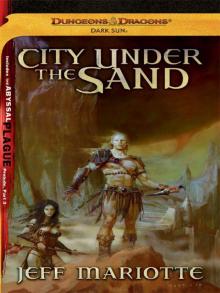 City Under the Sand
City Under the Sand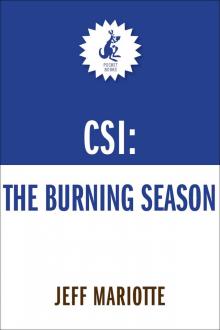 The Burning Season
The Burning Season Sanctuary
Sanctuary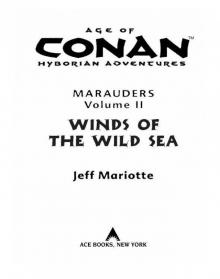 Winds of the Wild Sea
Winds of the Wild Sea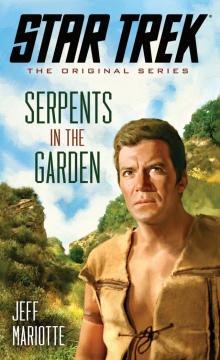 Serpents in the Garden
Serpents in the Garden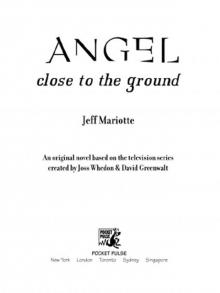 Close to the Ground
Close to the Ground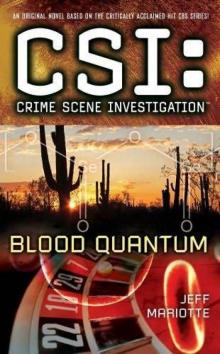 Blood Quantum
Blood Quantum Brass in Pocket
Brass in Pocket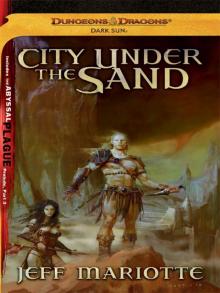 City Under the Sand: A Dark Sun Novel (Dungeons & Dragons: Dark Sun)
City Under the Sand: A Dark Sun Novel (Dungeons & Dragons: Dark Sun)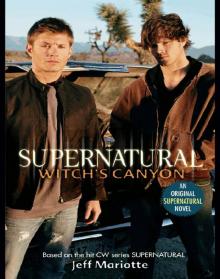 Witch's Canyon
Witch's Canyon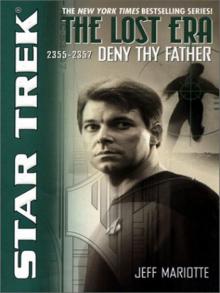 STAR TREK: The Lost Era - 2355-2357 - Deny Thy Father
STAR TREK: The Lost Era - 2355-2357 - Deny Thy Father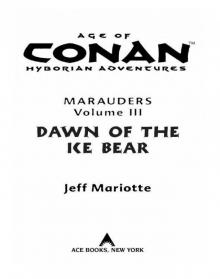 Dawn of the Ice Bear
Dawn of the Ice Bear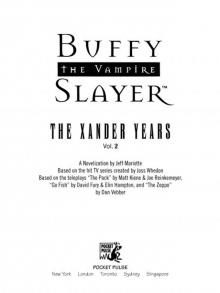 The Xander Years, Vol.2
The Xander Years, Vol.2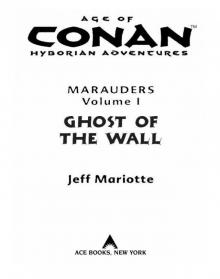 Ghost of the Wall
Ghost of the Wall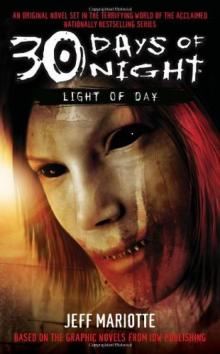 30 Days of Night: Light of Day
30 Days of Night: Light of Day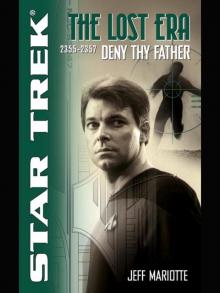 Deny Thy Father
Deny Thy Father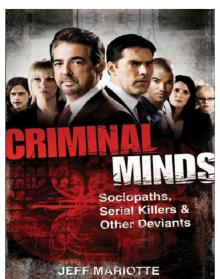 Criminal Minds
Criminal Minds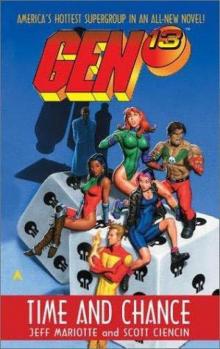 Time and Chance
Time and Chance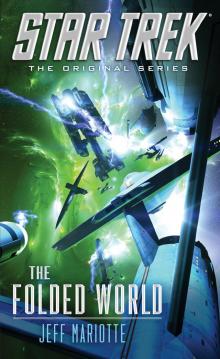 The Folded World
The Folded World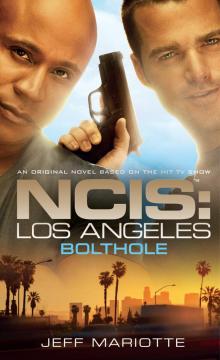 Bolthole
Bolthole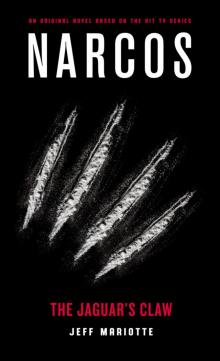 Narcos
Narcos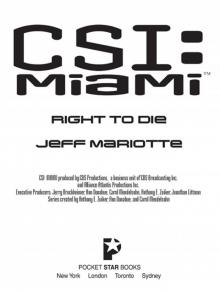 Right to Die
Right to Die